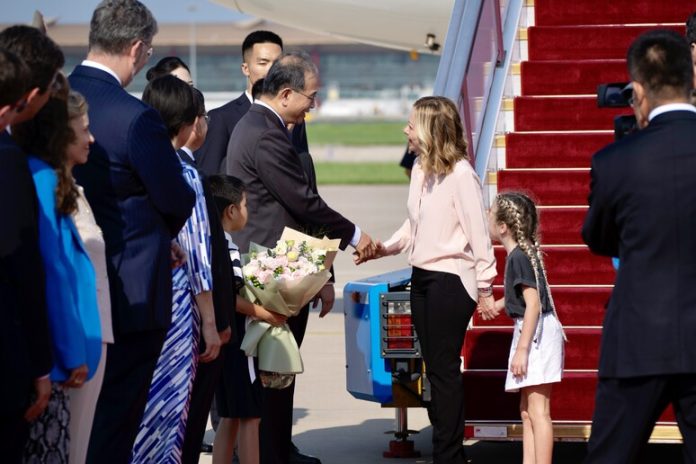Italian Prime Minister Giorgia Meloni, on her first official visit to China, announced her intention to resume co-operation with Beijing by signing a three-year action plan, according to Chinese media.
On the invitation of Chinese Premier Li Qiang, the Italian Prime Minister is paying an official visit to China from 27 to 31 July. Besides, Chinese President Xi Jinping will meet Meloni during the visit. According to a video shared by Meloni’s office, Li underlined at the opening of the forum that “China and Italy should adopt a win-win mentality and increase trade and investment co-operation, making co-operation even more dynamic and sustainable.”
The Italian leader stated her five-day visit was a demonstration of the will to start a new phase, to renew bilateral co-operation between the two countries, which will focus on experimenting with new forms of co-operation. She also attended the Italy-China Business Forum, to which companies such as Italian tyre maker Pirelli, energy group ENI, defence group Leonardo, wine producers and several Italian luxury fashion groups such as Dolce & Gabbana are welcome.
Chinese State media said the purpose of the visit was to clarify some aspects of Italy’s withdrawal from the Belt and Road Initiative (BRI) and to emphasise the importance of economic ties. Italy became the only G7 country to join China’s sweeping initiative in 2019, but was forced to back out last year under US pressure.
The Meloni government said the deal did not benefit Italy, whose annual trade with China of €73.9 billion ($80 billion) shifts heavily in favour of Beijing, according to the latest figures. Italy is China’s fourth-largest trading partner in the European Union, and China is Italy’s largest trading partner in Asia. Total imports and exports between China and Italy rose by four per cent in the first quarter of thi year.
Italy’s foreign direct investment in China amounts to €15 billion. More than 1,600 Italian companies operate in China, especially in textiles, machinery, pharmaceuticals, energy and heavy industry. Nevertheless, Italy supported the European Commission’s decision to impose temporary duties of up to 37.6 per cent on electric vehicle imported from China. Beijing, in turn, reacted to the investigation and launched retaliatory investigations on European brandy and pork.
Despite the difficulties in relations, cultural exchanges between China and Italy have built a bridge of understanding between the two nations, Chinese media reported. The number of Chinese students in Italy and Italian students in China continues to grow, and the fashion for learning Chinese continues to flourish in Italy. China has also introduced and extended relevant visa-free policies for many European countries, including Italy.
In 2022, the two countries joined forces to hold a series of cultural events this year to commemorate the 700th anniversary of the death of Marco Polo, the 13th century explorer who travelled along the ancient Silk Road to China, reaffirming the importance of exchange and mutual learning between civilisations. Plus, the two sides have co-operated in setting up 12 Confucius Institutes and 39 Confucius Classes in Italy. To date, China and Italy have established 86 pairs of twinning provinces, cities and regions.
China and Italy established diplomatic relations in 1970, but this year marks the 20th anniversary of the comprehensive strategic partnership between China and Italy.
